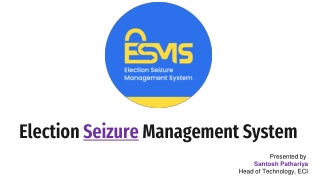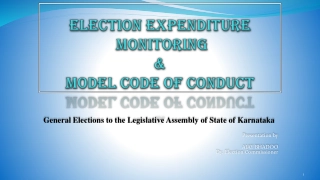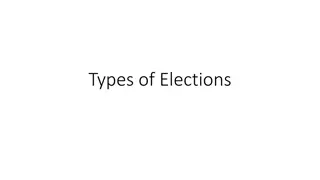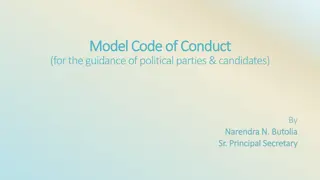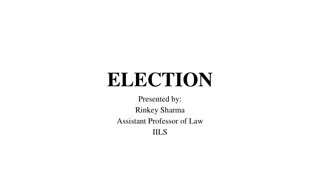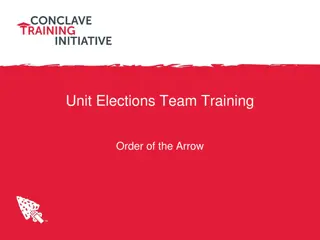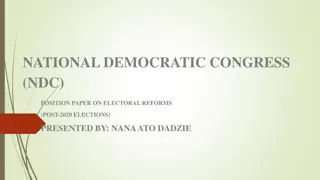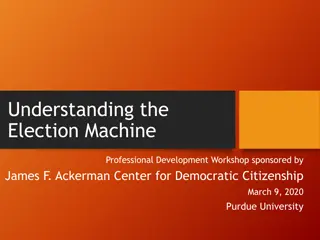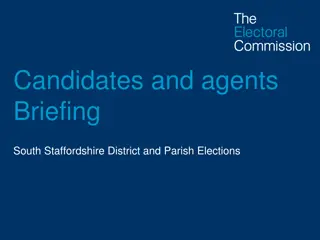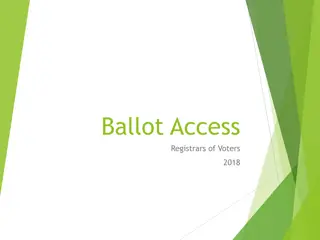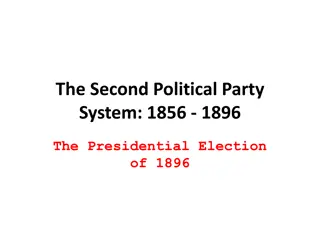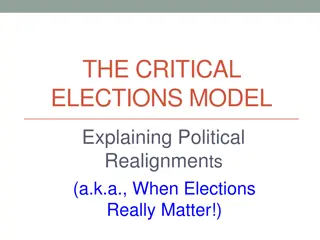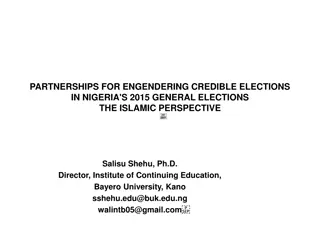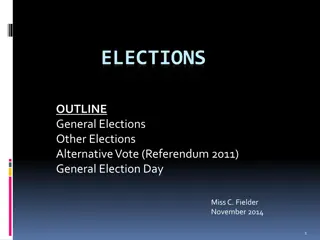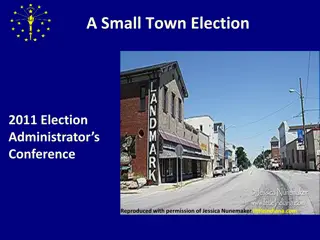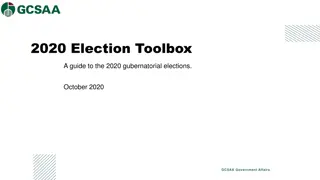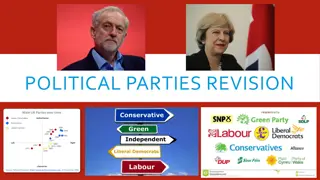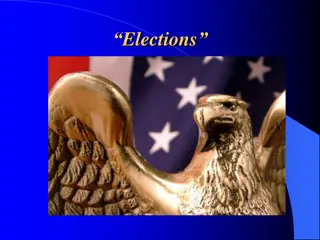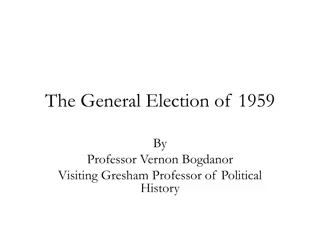Election SeizureManagement System
The Election Seizure Management System (ESMS) presented by Santosh Pathariya, Head of Technology at ECI, aims to ensure inducement-free elections through digitizing data for intercepted/seized items like cash, liquor, drugs, etc. The system involves various agencies and users for real-time reporting
3 views • 48 slides
Election Expenditure Monitoring in Karnataka State Legislative Assembly Elections
Presentation on the impact of money power in elections, the objective of election expenditure monitoring, legal provisions, machinery involved, role of expenditure observers, and focus areas for monitoring. Details on cases of rescinding elections due to detected money use, types of election expendi
0 views • 59 slides
Supreme Court Rejects Petitions Against EVM Use In Elections
Supreme Court Rejects Petitions Against EVM Use In Elections\\nNew Delhi: \\nThe Supreme Court on Friday dismissed two writ petitions: namely, apprehensions over 19 lakhs missing EVMs and another petition to use ballot paper to conduct elections while reposing its faith in the EVMs.\\nAdjudicating t
1 views • 4 slides
Democracy in the EU and Upcoming European Elections Overview
Explore key findings on the state of democracy in the EU, upcoming European elections, and global trends. Europe remains a high-performing region, with Central Europe showing notable democratic growth. Discover how the EU acts as a countervailing institution and challenges faced by strong democracie
0 views • 15 slides
Understanding Elections in West Virginia
Learn about types of elections, voting requirements, absentee voting, primary elections, general elections, and other types of elections in West Virginia. Discover how to participate in the electoral process and make your voice heard.
0 views • 9 slides
Interdisciplinary Approach in Political Science and Its Relation with History
The need for an interdisciplinary approach in political science emerged in the 20th century to study political issues from various social science perspectives. This approach emphasizes the interrelation between political science and other disciplines like history. History provides the foundation for
0 views • 23 slides
Institutionalism and Methodological Issues in Political Science
Institutionalism is a foundational concept in political science, emphasizing the study of governing institutions and their role in shaping political behavior. It explores inductive and deductive approaches to research, highlighting the significance of empirical evidence and theoretical assumptions.
0 views • 19 slides
Understanding Gramsci's Political Theory and its Relevance Today
Gramsci's political theory, focusing on concepts such as hegemony, historical bloc, and the role of intellectuals, offers valuable insights into contemporary political challenges. Explored through the lenses of Prof. Ken Spours and Stuart Hall's analytical tradition, this analysis sheds light on Con
0 views • 13 slides
Understanding the Model Code of Conduct for Political Parties and Candidates
Model Code of Conduct (MCC) is a set of norms developed in consensus by political parties and enforced by the Election Commission to ensure fair elections. It establishes guidelines for general conduct, meetings, processions, polling day, observers, parties in power, and election manifestos. The MCC
0 views • 33 slides
Evolution of Citizenship in Liberal Democracy
Citizenship within liberal democracy entails equal rights, duties, liberties, and constraints for individuals within a political community. The entrenchment of civil and political rights has shaped the struggle for membership and participation in political communities. Civil rights, essential for in
1 views • 11 slides
Understanding Elections: Types, Procedures, and Election Commission of India
Election is a vital process where representatives are chosen by voting to govern the country. This article covers the meaning of elections, types such as general, mid-term, and by-elections, and the conduct of election procedures. It also delves into the Election Commission of India, its composition
1 views • 11 slides
Unit Elections Team Training and Responsibilities
This resource covers the roles and responsibilities of a Unit Elections Committee in the Order of the Arrow organization. It includes details on coordinating all aspects of unit elections, training teams, scheduling elections, communicating with leaders, recording results, reviewing evaluation repor
0 views • 58 slides
Understanding Political Theory through a Contextual Approach
Exploring G.H. Sabine's perspective on political theory through a contextual approach, emphasizing the importance of historical context and societal influences. Sabine argues that while political theory evolves with its contemporary politics, it should be analyzed within its specific time and social
0 views • 9 slides
NDC Position Paper on Electoral Reforms Post-2020 Elections
National Democratic Congress (NDC) presents key recommendations for electoral reforms post the 2020 elections. Recommendations include transparency in recruitment of temporary staff, providing final voter register to parties, and ensuring non-partisan recruitment of election officials. Justification
0 views • 51 slides
Election Machine Professional Development Workshop at Purdue University
Explore the Election Machine Professional Development Workshop held at Purdue University, sponsored by the James F. Ackerman Center for Democratic Citizenship. The workshop focused on Teaching Elections and featured insights on the importance of fact-based analysis, economics in presidential electio
3 views • 63 slides
Analysis of Facebook Affordances for Political Parties During the 2014 EU Elections
Research by Karolina Koc-Michalska and Darren Lilleker explores how political parties across 28 countries utilized Facebook affordances during the 2014 European Parliament elections. The study investigates the impact of social media on voter behavior, community building, and political engagement. Fi
0 views • 22 slides
Guide to South Staffordshire District and Parish Elections Process
This guide provides essential information on the South Staffordshire District and Parish Elections process, including key dates, roles of election officers, timetables, candidate qualifications, disqualifications, nominations, voter registration, postal voting, and more. It covers important details
1 views • 42 slides
Understanding Ballot Access and Political Party Definitions for Elections
Learn about the definitions of key terms related to elections, such as caucus, convention, party-endorsed candidate, primary, district, municipal office, major party, minor party, state office, and endorsement. These definitions provide insight into the electoral process, including how candidates ar
0 views • 29 slides
Understanding the Electoral Process: Primaries, Elections, and the Electoral College
Learn about the different levels of elections, including primary and general elections, and how the Electoral College functions in the U.S. political system. Understand the nomination process and the significance of voter participation in choosing political leaders. Explore the roles of federal, sta
1 views • 15 slides
Understanding the Evolution of the U.S. Election Process
Explore the historical journey of the U.S. election process from the creation of political parties to the expansion of voting rights. Learn about the roles of Democrats, Republicans, and the electoral system in shaping American democracy. Understand the intricacies of general and primary elections,
0 views • 14 slides
Political Landscape and Elections in the Late 19th Century
The political scene in the late 19th century in the United States was marked by the rise of the Second Party System, leading up to the pivotal Presidential Election of 1896. The Congressional elections of the era reflected shifts in power between Democrats, Republicans, and various opposition groups
0 views • 12 slides
Understanding Political Parties and Ideologies in the United States
Exploring the development and dynamics of political parties in the United States, this content delves into the definition of political parties, the two-party system, the political spectrum, major parties' differences, and the roles of Democrats and Republicans. It also touches upon third parties' ch
0 views • 18 slides
Understanding Critical Elections Model: Political Realignments
Critical Elections Model explains significant shifts in party loyalty and control of the political system. Historical examples like the 1860 and 1932 elections showcase lasting impacts on government structures due to key issues that divided parties. The model highlights the importance of national is
0 views • 12 slides
Insights on Elections, Markets, and Your Portfolio: An Analyst's Playbook
Explore the historical impact of elections on portfolios, economic policies, and market uncertainties. Gain valuable insights on election cycles, market trends during election years, correlations between elections and recessions, and historical market performance based on different presidential term
0 views • 47 slides
Political Development Theory and Practice: An Overview
Political development refers to the evolution of institutions forming the political power system of a society. Initially popular in the 60s-70s to describe political change, it later fell out of favor for being Euro-centric but has since regained significance. The concept encompasses aspects like po
0 views • 13 slides
Understanding Political Party Funding Act of 2018
The Political Party Funding Act of 2018 regulates the funding of political parties in South Africa, ensuring equitable and proportional funding for parties participating in national and provincial legislatures. The Act defines various terms such as donations, foreign persons, and political parties,
0 views • 42 slides
Recap of US Presidential Elections from 1980s to 2000s
Explore a recap of key US Presidential elections from the 1980s to the 2000s, including the victories of Ronald Reagan, George H.W. Bush, and the notable matchups against rivals like Jimmy Carter and Michael Dukakis. Learn about the political landscapes, campaign strategies, and outcomes that shaped
0 views • 23 slides
Understanding Ballot Layouts and Types for Elections in Indiana
Explore the various ballot layouts and types for elections in Indiana, including primary and general elections, with a focus on different variations such as D & R primary ballots, local public question-only ballots, and federal-only ballots. Learn how to prepare ballots for different scenarios and u
0 views • 9 slides
Partnerships for Engendering Credible Elections in Nigeria's 2015 General Elections: The Islamic Perspective
The quest for credible elections in Nigeria is crucial for forging responsible leadership and good governance. This article explores the Islamic perspective on forming partnerships to ensure free, fair, and credible elections, highlighting the importance of historical frameworks, interfaith collabor
0 views • 13 slides
Understanding UK Elections and Political Systems
Explore the intricacies of UK elections and its political systems, including the roles of Parliament, the House of Commons, and the House of Lords. Learn about the General Election process, First-Past-the-Post system, constituencies, and the various types of elections in the UK like the Scottish Par
0 views • 10 slides
Understanding Small Town Elections: Procedures and Responsibilities
Explore the intricacies of small town elections, from defining small towns to the roles and procedures involved. Discover who conducts the elections, how candidates are nominated, and the powers of the Town Election Board. Gain insights into the differences between county and town election boards in
0 views • 29 slides
Explore the Fascinating World of Political Science
The Department of Political Science offers a range of courses, delving into topics such as political theory, international relations, and governance. Understand the distinction between politicians and political scientists, and explore branches of political science like public administration and huma
0 views • 16 slides
Guide to 2020 Gubernatorial Elections: Key Insights and Trends
An insightful guide to the 2020 gubernatorial elections highlighting key trends and factors influencing the races. It discusses party flips, incumbent advantages, open seats, and fundraising data, providing a comprehensive overview of the landscape. With a focus on governors' response to the COVID-1
0 views • 4 slides
Understanding Political Parties and Factional Politics
Political parties are groups with shared values aiming to win power through elections. They produce manifestos outlining their policies. Factions within parties may support different leaders or policies, influencing party dynamics. Parties play essential roles in shaping government policies and enga
0 views • 24 slides
Understanding the Electoral Process in the United States
Elections in the U.S. consist of primary and general elections at federal, state, and local levels. Primary elections select candidates within political parties, while general elections determine officeholders such as the President and Congress members. The Electoral College plays a crucial role in
0 views • 15 slides
Evolution of Political Protests in Modern Russia: A Historical Overview
This article provides an in-depth analysis of the evolution of political protests in modern Russia from 1990 to present. It discusses the attitude of Russian journalists towards protests, basic concepts of political protest in modern political science, myths surrounding protests in Russia, and the f
0 views • 24 slides
General Elections of the 1950s: A Political Overview
The General Elections of the 1950s saw significant shifts in power between the Conservative and Labour parties in the UK. In 1951, the Conservatives narrowly won over Labour, while in 1955 and 1959, they secured more decisive victories. The swing towards the Conservatives in each election reflects c
0 views • 4 slides
Impact of Political Stability on Equity Trading Costs of Cross-Listed Firms
The research explores the relationship between political stability and equity trading costs of cross-listed firms, highlighting the impact of political institutions, liquidity, and investor protection. It delves into the importance of factors like quality of political institutions, transparency, and
0 views • 24 slides
Understanding Comparative Politics: Power, Influence, and Political Phenomena
Politics involves power and influence, where individuals strive to achieve their goals by influencing others or breaking free from external influences. Political science delves into the study of power and political phenomena, while comparative politics focuses on analyzing political dynamics within
0 views • 21 slides
Interdisciplinary Relationships in Political Science
Political science and history share a symbiotic relationship, with history providing the foundation for political analysis while political science influences historical events. The contribution of economics to political science is evident in how economic conditions shape political ideologies and pol
0 views • 12 slides
